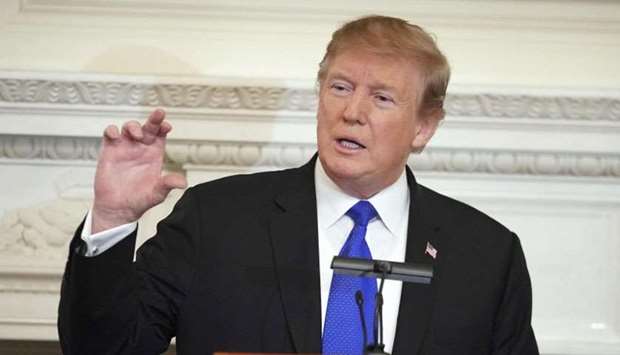President Donald Trump announced yesterday that some 1,500 additional US troops would deploy to the Middle East against a backdrop of soaring tensions with Iran.
“We want to have protection in the Middle East,” Trump told reporters as he prepared to set off on a trip to Japan.
“We’re going to be sending a relatively small number of troops, mostly protective,” Trump added.”It’ll be about 1,500 people.”
The deployment includes reconnaissance aircraft, fighter jets, engineers, and the extension of the presence of a Patriot missile defense battalion that accounts for 600 of the personnel. “This is a prudent response to credible threats from Iran,” said Acting Defence Secretary Patrick Shanahan.Pentagon officials said the 1,500 additional troops were in response to recent incidents in the region that US intelligence had tied to Iran’s leadership.
Those have included a rocket attack on the Green Zone in Baghdad, explosive devices that damaged four tankers in Fujairah at the entrance to the Gulf, and a Houthi drone attack against a Saudi oil installation.
“We view this as a campaign,” said Rear Admiral Michael Gilday, director of the Pentagon’s Joint Staff.
Gilday stressed that the expanded US military presence in the region, including an aircraft carrier task force, B-52 bombers, and an amphibious attack vessel deployed earlier this month, are defensive and meant to address an alleged ongoing threat from Iran.
ARMS SALES
Meanwhile, Trump, saying there is a national emergency because of tensions with Iran, is clearing the sale of billions of dollars worth of weapons to Saudi Arabia and other countries, US senators said yesterday, despite strong resistance to the plan from both Republicans and Democrats.
The administration has informed congressional committees that it will go ahead with 22 arms deals worth some $8bn, congressional aides said, sweeping aside a long-standing precedent for congressional review of such sales.Some lawmakers and congressional aides had warned earlier this week that Trump, frustrated with Congress holding up weapons sales like a major deal to sell Raytheon Co precision-guided munitions to Saudi Arabia, was considering using a loophole in arms control law to go ahead with the sale by declaring a national emergency.
“I am disappointed, but not surprised, that the Trump Administration has failed once again to prioritise our long-term national security interests or stand up for human rights, and instead is granting favours to authoritarian countries like Saudi Arabia,” Senator Bob Menendez said in a statement.
Menendez is one of the members of Congress who reviews such sales because he is the ranking Democrat on the Senate Foreign Relations Committee.
Another, the Republican Foreign Relations Committee chairman, Senator Jim Risch, said he had received formal notification of the administration’s intent to move forward with “a number of arms sales.”
In a statement, Risch said, “I am reviewing and analysing the legal justification for this action and the associated implications.”
OMAN’S PEACE EFFORTS
Oman said yesterday it was trying to reduce spiralling tensions between the Unites States and Iran, as the Pentagon confirmed it was considering deploying more troops to the region.
The sultanate, which faces Iran across the highly sensitive Strait of Hormuz at the entrance to the Gulf, has maintained good relations with Tehran throughout successive regional crises.That has at times allowed it to play an important mediating role, including with the United States.
“We and other parties seek to calm tensions between Washington and Tehran,” Muscat’s state minister for foreign affairs Yusuf bin Alawi bin Abdullah said in a statement.
“A war could harm the whole world, and both the American and Iranian sides are ‘aware of the dangers’.”
Abdullah earlier this week visited Tehran, where he met Iranian Foreign Minister Mohamed Javad Zarif, Tehran’s official state news agency IRNA said.
Oman played a crucial role in bringing US and Iranian negotiators together for the preliminary talks that ultimately led to a landmark 2015 nuclear deal between Iran and major powers, including the United States.
The current crisis began when President Donald Trump abandoned the deal in May last year and gradually reimposed crippling sanctions that have left Iran’s economy reeling.

US President Donald Trump


